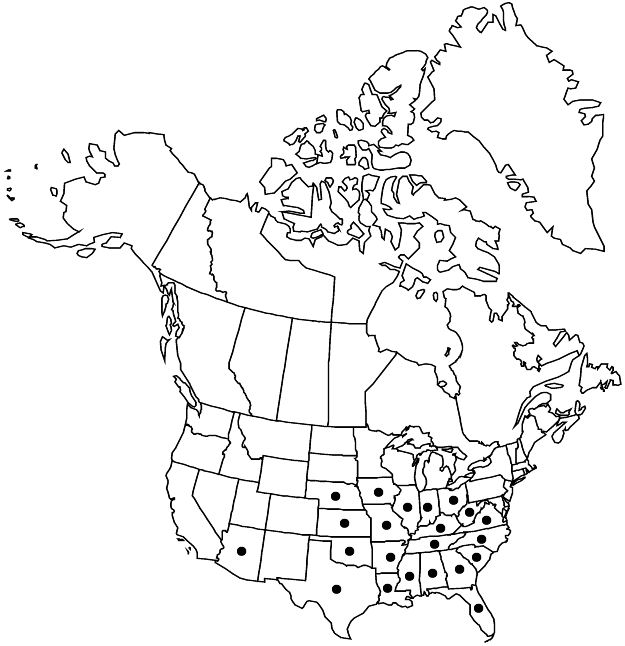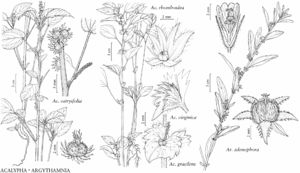Acalypha ostryifolia
Mem. Torrey Bot. Club 5: 213. 1894. (as ostryaefolia)
Herbs, annual, 3.5–7 dm, monoecious. Stems erect, pubescent, sparsely hirsute, and stipitate-glandular. Leaves: petiole 1.5–6.5 cm; blade ovate, 3–8 × 1.5–5 cm, base cordate, margins serrate, apex acute to short acuminate. Inflorescences unisexual, axillary (staminate) and terminal (pistillate; sometimes on short lateral branches, appearing axillary); staminate peduncle 0.5–1.5 cm, fertile portion 0.5–3.5 cm; pistillate peduncle 0.1–1 cm, fertile portion 3–7 × 0.7–1 cm; allomorphic pistillate flowers common, near apices of pistillate inflorescences. Pistillate bracts (normal and allomorphic flowers) loosely arranged (inflorescence axis visible between bracts), 3–6 × 6–8 mm, abaxial surface pubescent (hairs to 0.3 mm) and sparsely stipitate-glandular; lobes (9–)13–17, linear, 2/3 bract length, muricate. Pedicels of allomorphic flowers rudimentary. Pistillate flowers: pistil 3-carpellate (normal flowers), 1(–3)-carpellate (allomorphic flowers); styles multifid or laciniate. Capsules spiny, pubescent; allomorphic fruits obovoid, 2 irregular flanges near apex, 2–2.2 × 1.6–1.8 mm, smooth, pubescent. Seeds 1.6–2 mm, tuberculate.
Phenology: Flowering and fruiting summer–fall.
Habitat: Stream banks, edges of woods, disturbed areas, agricultural fields.
Elevation: 0–1700 m.
Distribution

Ala., Ariz., Ark., Fla., Ga., Ill., Ind., Iowa, Kans., Ky., La., Miss., Mo., Nebr., N.C., Ohio, Okla., S.C., Tenn., Tex., Va., W.Va., Mexico, West Indies, introduced to Central America.
Discussion
J. Torrey [in W. H. Emory 1857–1859, vol. 2(1)] reported Acalypha ostryifolia (as A. caroliniana Elliott) from New Mexico on the basis of Bigelow s.n., collected near "the Copper Mines" in Grant County. Although no specimen has been located by the author and this is the only report of this species from New Mexico, it is to be expected in the southwestern part of the state. It was collected in the late nineteenth century in New Jersey and Pennsylvania, but has not been collected there since.
Acalypha ostryifolia may not be native to the northern part of its range. Specimen collection dates suggest that the species is spreading northward, and in much of its range it is found primarily in areas with human disturbance.
Selected References
None.
